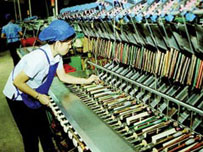
| House committee wants loan subsidies to end as planned | |
The Vietnamese government’s interest rate subsidy program should end this year as planned to prevent an imbalance of payments, said the National Assembly Finance and Budget Committee. The committee said in its review of national budget allocations in 2009 that it would be necessary to continue fiscal stimulus measures next year as the economy was still in recovery mode. However, the stimulus next year should be more concentrated, focusing mainly on economic reforms to ensure stable economic growth, the committee said. Vietnam put in place a fiscal stimulus package that it values at 8.6 percent of gross domestic product in a bid to boost economic growth, which slowed to 3.9 percent in the first half of this year from 6.2 percent in 2008. Measures included tax exemptions, reductions and deferments for businesses, and an interest rate subsidy program, under which eligible businesses receive 4-percent subsidies on short-term loans.
Phung Quoc Hien, chairman of the committee, said Tuesday that although the interest rate subsidy program had helped bail out many businesses this year, it should wrap up at the end of this year.
Loan subsidies have created unfair competition among businesses as only 20 percent of them benefited from the program, Hien said. Some companies given the subsidies reportedly used the loans improperly, for instance, to repay old debts, invest in stock and property markets, or to make deposits at banks, he said.
Hien said next year the government should only give rate subsidies to medium and long-term loans in order to help restructure the economy in a long run.
By the end of September, total outstanding loans under a government subsidy program were about VND405 trillion (USD22.7 billion), Prime Minister Nguyen Tan Dung said in a speech at the opening of the National Assembly session Tuesday (20 Oct).
The Asian Development Bank said last month that this year’s stimulus package may increase Vietnam’s budget deficit to as much as 10.3 percent of GDP from 4.1 percent in 2008.
The finance and budget committee suggested that the government stop giving tax breaks to local businesses next year. Finance Minister Vu Van Ninh told the media Tuesday that his ministry shared the same view. | |
| Thanh Nien News |
